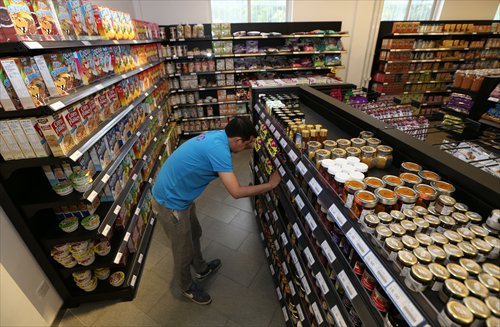Australian delegation seeks China opportunities
Visit aims to build on trade cooperation under new FTA

An employee at the Nantong Free Trade Zone in East China's Jiangsu Province arranges imported honey products from Australia in June 2015. Photo: CFP
Australia sent its largest-ever business delegation to China on Monday to seek more opportunities, amid rapid expansion in trade and investment between the two countries under the recently signed free trade agreement.
Opportunities are abundant for both countries, but improvements are still needed to boost cooperation, experts noted.
The Australian delegation, led by Minister for Trade and Investment Steven Ciobo and made up of over 1,000 business leaders, kicked off the Australia Week in China 2016 (AWIC), which aims to expand business in China and attract more Chinese investment in Australia, according to a press release from the Australian Trade Commission that was sent to the Global Times on Monday.
"China is the world's second-largest economy and Australia's largest partner," Ciobo was quoted as saying in the press release. "We are confident that AWIC 2016 will facilitate the opening up of more mutual trade, investment and co-operation opportunities in the various industry streams. No doubt, this visit will also enhance and take our bilateral relationship to an even stronger level."
Given the current economic transitions in both countries and the signing of the China-Australia Free Trade Agreement (ChaFTA), "the overall environment for business cooperation between Australia and China is especially good now," Liu Chuyang, a trade commissioner at the Australian Embassy in China, told the Global Times on Monday.
Liu said China presents a lot of opportunities for Australian firms in the services sector, including health and elderly care, financial services and the pharmaceutical industry, as China's middle class population continues to grow.
"There is a lot of excitement on both sides in our discussions with Chinese business leaders today," Liu said, noting that with the help of ChaFTA, cooperation in the services sector will expand fast.
China and Australia signed the ChaFTA in June 2015 and implemented the agreement on December 20, 2015.
Under the ChaFTA, more than 86 percent of Australian exports can now enter China duty free, and that will rise to 94 percent in January 2019 and 96 percent in January 2029.
"The FTA will no doubt help to further lift the already-large bilateral trade and investment between the two sides," Mei Xinyu, a researcher at the Chinese Academy of International Trade and Economic Cooperation (CAITEC) under the Ministry of Commerce, told the Global Times on Monday.
Trade, investment growing
Trade and investment between Australia and China have been growing fast, particularly investment.
In 2015, China's direct investment in the country topped $11.1 billion, up 32.9 percent year-on-year, making Australia the second-most favored country by Chinese investors after the US from 2005 to 2015, according to a report jointly released by KPMG Australia and The University of Sydney on Monday.
2015 saw the second-highest inflow of Chinese investment into Australia, behind the previous peak driven by mining sector investment in 2008, when investment from China reached $16.2 billion, the report said.
Australia's real estate sector drew 45 percent of China's total investment in the country in 2015, the dominant area for the second year in a row, the report noted. Other sectors such as renewable energy, healthcare, mining and infrastructure also drew large amounts of Chinese investment, according to the report.
Improvements needed
However, experts said improvements are needed to build cooperation between the two countries, with concerns arising over the Australian government's handling of some business deals involving Chinese investors.
An A$506 million offer from China's privately owned Landbridge Group for a 99-year lease of the Port of Darwin provoked complaints from the US as the port is used by US Marines, earlier media reports said.
Following the news, the Australian government said in March that sales of critical infrastructure projects in Australia to foreign private firms will be reviewed by the country's Foreign Investment Review Board (FIRB), while previously only sales to foreign State-owned firms would be reviewed.
"This shows there are still areas where improvements are necessary to facilitate cooperation," said Mei from CAITEC. "Australia should not artificially politicize such business deals and should further open up its market to Chinese investors."
But a KPMG expert dismissed the concerns. "I don't think it should [dampen Chinese investment in Australia's infrastructure] as this applies to all foreign investors, not only the Chinese. The process of engagement and consultation with FIRB is pretty well understood by experienced investors and advisory firms can provide assistance for newcomers," Doug Ferguson, a partner at KPMG Australia, told the Global Times Monday.